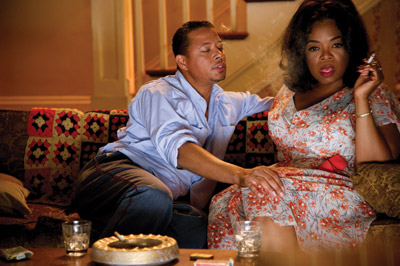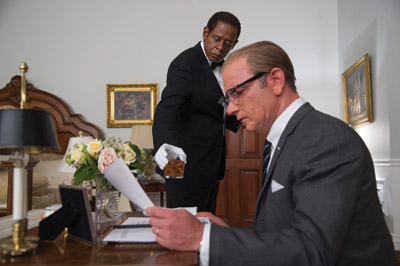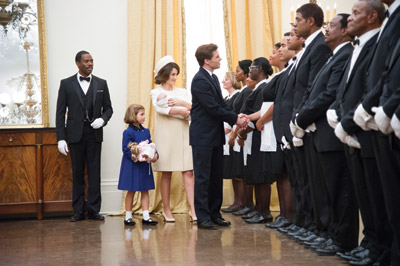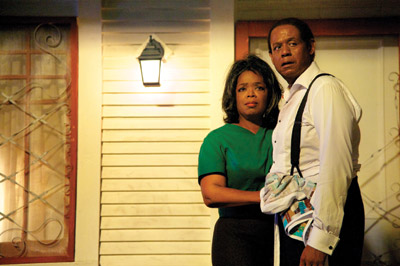Lee Daniels The Butler Interview

Lee Daniels The Butler Interview
Cast: Oprah Winfrey, David Oyelowo, Yaya Alafia, Forest Whitaker, Elijah Kelley, Mariah Carey, John Cusack, Jane Fonda, Cuba Gooding, Jr., Terrence Howard, Elijah Kelley, Minka Kelly, Lenny Kravitz, James Marsden, Alex Pettyfer, Vanessa Redgrave, Alan Rickman, Liev Schreiber, Robin Williams
Director: Lee Daniels
Genre: Biography, Drama
Running Time: 132 minutes
Synopsis: Set against the tumultuous political backdrop of 20th century America, Academy Award® nominated director Lee Daniels' (Precious) epic drama Lee Daniels' The Butler tells the story 'of Cecil Gaines (Forest Whitaker), an African American butler who serves at the White House during seven presidential administrations between 1957 and 1986.
Inspired by Wil Haygood's 2008 Washington Post article 'A Butler Well Served by This Election" about the real life of former White House butler Eugene Allen, Lee Daniels' The Butler traces the dramatic civil rights struggles that ultimately made it possible for an African American to rise to the highest position in the White House with the election of Barack Obama in 2008.
Opening in the fiercely segregated South in 1926, young Cecil Gaines works with his family in the cotton fields of Macon, GA. The tragic death of his father at the hands of his employer opens up unexpected opportunities for a young and impressionable Cecil, who is then taught the duties of a house servant under the critical eye of the plantation's white matriarch. Armed with these new skills and concerned for his own life, Cecil sets out for a better life as a young man.
Struggling outside of the confines of the plantation, an act of desperation introduces Cecil to a much-needed father figure, who provides guidance and a job at a local hotel. Thriving under his tutelage, Cecil is encouraged to move to Washington, DC, to take a position at an elite hotel. Excelling there, Cecil is noticed by a White House administrator, who gives him the chance of a lifetime: a job as a butler at 1600 Pennsylvania Avenue, insuring a comfortable middle-class life for Cecil's wife Gloria (Oscar® nominee Oprah Winfrey) and sons Louis (David Oyelowo) and Charlie (Elijah Kelley), far from the cotton fields of the South.
While Presidents come and go, from Eisenhower through Reagan, Cecil and the rest of the butler staff remain, serving in the background as firsthand but silent witnesses to history and the inner workings of the Oval Office while the civil rights movement unfolds. Regardless of his personal opinions, Cecil remains fiercely committed to his duties at the White House, but tensions grow at home as his sons become affected by the social and political upheaval that characterized the 1960s and 70s. Louis chooses to attend college in the South so that he may become an active part of the burgeoning civil rights movement, participating in department store sit-ins and freedom rides - putting him in physical danger and widening his rift with Cecil. Charlie instead elects to work for change from within, enlisting to fight for his country in Vietnam. Facing these disruptions to her family, as well as Cecil's neglect as he tends to his First Family, Gloria turns to alcohol and the embrace of a neighbour. As he grapples with his family's actions and his own conscience, Cecil finds himself at the crossroads of previously unimaginable social change.
Through the eyes and emotions of the Gaines family, Daniels' film follows the changing tides of American politics and race relations; from the assassinations of John F. Kennedy and Martin Luther King, to the Freedom Riders and Black Panther movements, to the war in Vietnam and the Watergate scandal, Cecil experiences the effects of these events as both an insider and a family man. Drawn into conflict with his headstrong sons, eager to forge their own paths in a rapidly transforming world, Cecil's story is as universal as it is extraordinary, speaking to the way each generation attempts to define the American Dream.
With an incredible supporting cast that includes Yaya Alafia, Mariah Carey, John Cusack, Jane Fonda, Cuba Gooding, Jr., Terrence Howard, Elijah Kelley, Minka Kelly, Lenny Kravitz, James Marsden, Alex Pettyfer, Vanessa Redgrave, Alan Rickman, Liev Schreiber and Robin Williams, Lee Daniel' The Butler is a story about the resilience of one man, the growth of a nation, and the power of family.
The Butler
Release Date: October 31st, 2013
Interview with Lee Daniels
Question: Tell us a little about the genesis of the film and about working with producer Laura Ziskin.
 Lee Daniels: I received the script for the film from a producer who I held in high regard named Laura Ziskin, who's now passed. I loved her and I loved the idea of Wil Haygood's Washington Post piece, which Amy Pascal at Sony had bought the rights to. I was excited, as it was post-Precious and I loved working with Laura. It was between me and another very famous director to direct the film, and she wanted me. She understood me – few people can understand my wavelength, and she did, and so I really fell in love with her.
Lee Daniels: I received the script for the film from a producer who I held in high regard named Laura Ziskin, who's now passed. I loved her and I loved the idea of Wil Haygood's Washington Post piece, which Amy Pascal at Sony had bought the rights to. I was excited, as it was post-Precious and I loved working with Laura. It was between me and another very famous director to direct the film, and she wanted me. She understood me – few people can understand my wavelength, and she did, and so I really fell in love with her. Laura would call me at 3am giving me notes on the script. At the time we were writing the story for Sony. I thought we were creating the story for Denzel at one point, but in the end he passed on the lead role, as did Will Smith. When we brought the script to Amy Pascal, she loved it. I could tell she was passionate about me and about the film, but at the end of the day the money there didn't add up. Laura had never gone into the world of raising money for films since she'd been at studios forever. I said, 'I come from the indie world; I'll show you how." Then we went off to get funding for the film.
During that time, Laura became sick. She was flying back and forth helping me with the creative side and also helping me raise money. She flew out to New York one week to meet with me. We worked from her hotel on the Upper East Side because she was too ill to go out. By the next Tuesday, she was back home in Santa Monica. She had found this black woman who had just won the lottery and wanted to invest in the film. I said to Laura that day, 'How do you do this? I just saw you a couple days ago, and here you are finding yet another investor. You're a gangster!" She told me she was just learning from me. Several days later she went into a coma, and that was it. She passed away Sunday evening.
This movie is for her. She believed in me more than I believed in myself. I didn't think I could do something this grand. It's a very big movie. It's multiple generations of the civil rights movement. No studio wanted to do this movie, even after the success of Precious and all the money that film had made, but Laura really knew that we could pull it off. Pam Williams, who ran Laura's company, helped me finish raising money.
Question: Why did you want to make this film? What made the story important to you?
Lee Daniels: The story was important to me because I'd never seen a film that chronicled the civil rights movement, from the beginning into the Obama administration, through the eyes of a father and son. This film puts a perspective on things that people went through, even in my lifetime, so that we could do things like vote. It goes beyond black and white, which was important to me, because it's a father-son story on top of being a civil rights story. It transcends race, it transcends America – it's universal. It's not just a history lesson, but rather the story of a family.
What I also loved about this story was that the father was a lot like my dad. This man, Cecil, sees his father shot on a plantation post-slavery. He has a different understanding of how to communicate with white people, like my dad did. He goes into the White House to work as a butler because he feels he can serve his country that way. He is proud of his job and proud to work to support his family, but his son is embarrassed by it. This butler has seen his father killed for speaking up to a white man, and so he doesn't know anything different than to be subservient and to serve. His son, on the other hand, thinks there's a different way of living. He begins passively with Martin Luther King, marching for the right to vote. Then MLK is killed and he realises that passive isn't the way that will work. So he becomes more militant, going to Malcom X and then the Black Panthers. All the while, his father is disapproving because not only is he working for the white man, he's working at the White House for the President of the United States. The question is raised of who's right and who's wrong. Is it by serving the presidents and serving passively? By getting white people to embrace and trust you, are you advancing people of colour? Or is it the right thing to march, speak out, and be willing to die for what you believe in? It's these questions that make Cecil and his son butt heads in the film, and that element made me want to jump into this story with all the heart that I jumped into Precious with.
 Question: This is different than any other film you've ever made. Are there differences in how you approached this material versus the other material you've worked with in the past?
Question: This is different than any other film you've ever made. Are there differences in how you approached this material versus the other material you've worked with in the past?Lee Daniels: This is the hardest movie I've ever directed. I realised early on that the way I view the world and the way the average person views the world is different. There's no sexual content, little profanity and the violence is at a minimum, though we're dealing with a very violent period in time. And so as a filmmaker I really had to restrain myself, and I'm proud of that. I had a great crew and an incredible group of actors that helped me help myself because they know I'm a free spirit. I embrace people who embrace me and the way I think and work. It's hard to do a PG-13 movie being Lee Daniels, but we did it.
Question: What was it like working with Forest Whitaker?
Lee Daniels: I think the people who have done this forever and the people who are secure in themselves are actually the most humble. Forest, in particular, is probably the most humble actor I've ever worked with in my life. How many Oscar winners are willing to come and audition for you? He also did exactly what I would ask for. That's how you know you have an actor who's confident – they do what you ask with no questions. A lot of actors don't realise they have to render themselves to the director. It's a rare gift. He and Oprah were magical as Cecil and Gloria. Forest brought elegance, class, and vulnerability to the character of Cecil that I don't think anyone else could have managed. He had an ability to make Cecil change, grow, and see the light.
Question: Tell us a little bit about Oprah's character, Gloria Gaines, who is Cecil's wife.
Lee Daniels: I love women. They're so complicated and beautiful to study. Black women are fascinating to study in how they've been able to evolve from slavery and adapt. We needed the black woman's voice in the script for this film, and we needed a complicated woman like my mom, or my aunts, or neighbours that took care of us growing up. That's why Oprah's character, Gloria, is complex. She might have an affair on her husband, Cecil, because he's not there, she might drink too much, she might smoke too many cigarettes. But I think that complexity is what makes life interesting and a story interesting. The Gaineses are not the Huxtables. Not that the Huxtables are bad, but these are complicated people because they come from slavery. Race is complicated.
Cecil and Gloria have two sons in the film. One, Charlie, is in Vietnam and is serving our country in that way. The other, Louis, is working with MLK, Malcolm X, and the Black Panthers. The film explores how the Gaines family is affected by these circumstances. The mother, Gloria, spins a bit out of control because both of her sons are at war – one internally, and one out of the country.
Question: What was it like getting Oprah back into acting, after such a long absence?
Lee Daniels: She had worked with me on Precious as an executive producer. I told her after that film that I wanted to work with her again, only as an actor because I think she's an incredible talent. I wanted her do something that would shake it up, so to speak. When I told her about this film, she liked the idea and so I went ahead with developing and rewriting the character for her. She jumped at the part and I'm so glad she did.
When you're working with an actor, you have to have an unequivocal trust. I can't shoot a scene unless I have the trust of the actor. It's an art form, like creating a dance or painting a portrait. With Oprah in particular, she hadn't worked as an actor in a long time, so it was nervewracking to carry the burden of making her as good as she was in The Color Purple. She was genius in that film. But on her first day on set, she came out with guns blazing. It was beautiful. She stands in line like everyone else for catering; she doesn't hold herself any differently than any other actor. She's a billionaire but she didn't act like one on set. She arrived every day on her own, without an entourage, and was very supportive to the entire process. She was there as a hired gun and she came to serve the character of Gloria as an actor. I look forward to working with her again.
Question: What was it like working on a film with such a large cast?
 Lee Daniels: Working on this was hard because normally I make a film that's a moment in time – a summer, or a year, and that's it. This one, on the other hand, was decades. There was one star after another. We start off with Robin Williams, and we move on to Vanessa Redgrave, and then to Mariah Carey and Lenny Kravitz and Cuba Gooding Jr. and Oprah Winfrey and Forest Whitaker and Terence Howard. To get performances from people, you have to spend time with them. You have to be not on the same page, but on the same syllable. Time is money and money we didn't have a lot of, so it was very difficult. But the actors really had a love affair with the film and I'm excited about every one of them. I think Jane Fonda is wonderful as Nancy Reagan, I think Alan Rickman is incredible as Ronald, as are Alex Pettyfer and David Banner.
Lee Daniels: Working on this was hard because normally I make a film that's a moment in time – a summer, or a year, and that's it. This one, on the other hand, was decades. There was one star after another. We start off with Robin Williams, and we move on to Vanessa Redgrave, and then to Mariah Carey and Lenny Kravitz and Cuba Gooding Jr. and Oprah Winfrey and Forest Whitaker and Terence Howard. To get performances from people, you have to spend time with them. You have to be not on the same page, but on the same syllable. Time is money and money we didn't have a lot of, so it was very difficult. But the actors really had a love affair with the film and I'm excited about every one of them. I think Jane Fonda is wonderful as Nancy Reagan, I think Alan Rickman is incredible as Ronald, as are Alex Pettyfer and David Banner. Casting the presidents was the tricky part, because I didn't want an audience to be like, 'Look at John Cusack playing President Nixon, or look at Robin Williams playing Eisenhower, or James Marsden playing Kennedy." You had to make them disappear, and to do that you had to not make them caricatures but instead just have them be human. My take on them was to approach them as just men. As an audience, I want people to feel how the weight of the world is on these men as presidents, whether you're republican or democrat, and whether you like them or not. These were men doing the best they could to serve our country. Kennedy was good and bad. Nixon was good and bad. Everyone's good and everyone's bad. I try to convey that idea in all of my films, including with these presidents. There's a grey area we all live in, and that's where the magic is at when you're telling a story.
Question: Was there a particular scene that was particularly challenging to shoot, or that stands out to you?
Lee Daniels: There's a scene where Oprah sits at the vanity and she's putting on lipstick. She's drunk and she wants her husband to make love to her. I was so nervous about shooting it. I thought to myself, 'How do I get the world to not recognise her as Oprah? She's Oprah Winfrey! How do I get her to disappear?" In it she talks about Jackie Kennedy and about how many pairs of shoes Jackie owns. She is resentful that her husband is in the White House tending to Jackie instead of tending to his own wife. When we went to shoot it, I was terrified because it's intimidating to critique her.
She was magical though, and she met me head to head with the words I'd written for her. It's one of my favourite scenes in the film.
Question: Did you have any moments in shooting this film where you felt especially close to the subject matter?
Lee Daniels: My 'aha" moment when I realised what my parents and grandparents had gone through happened when we were shooting the Freedom Riders bus scene. I was directing the scene on the bus. It was hot. There was no air conditioning because we were using an actual period bus that props had provided. I also had to direct the KKK clan outside the bus. I saw this angry group of a hundred mob people in KKK garb, and yelled 'Cut!" but they just kept coming at the bus because they couldn't hear me. It was in that moment that I suddenly realised what it must have felt like to be one of the kids on those Freedom Rider buses years ago.
Question: What do you want audiences to take away from the film?
Lee Daniels: Directing this film is the most important thing I've ever done in my career in cinema. It's an incredible task to take on a historical epic and it's terrifying because as a filmmaker, you want to make sure that you do it accurately. I hope people walk away with a sense of not forgetting what happened. We should remember that people died for our country and that there are heroes who aren't taught about in school. Those people are the reason Obama is in office.
The Butler
Release Date: October 31st, 2013
MORE
- Mission: Impossible Fallout
- Glenn Close The Wife
- Allison Chhorn Stanley's Mouth Interview
- Benicio Del Toro Sicario: Day of the Soldado
- Dame Judi Dench Tea With The Dames
- Sandra Bullock Ocean's 8
- Chris Pratt Jurassic World: Fallen Kingdom
- Claudia Sangiorgi Dalimore and Michelle Grace...
- Rachel McAdams Disobedience Interview
- Sebastián Lelio and Alessandro Nivola...
- Perri Cummings Trench Interview



